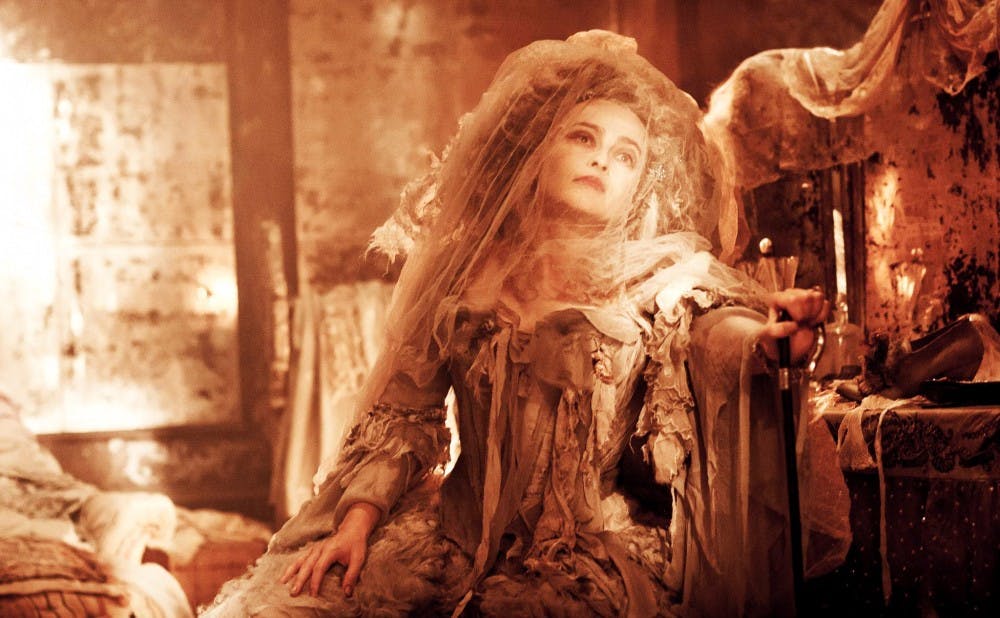When I first saw the latest “Great Expectations” adaptation, I was supposed to be focused on another Charles Dickens novel. On a flight to England, trying to finish reading “Bleak House” for my upcoming Victorian Literature class, I figured that one Dickens was as good as any to get me in the proper mood.
“Great Expectations” is arguably Dickens’s most exciting—and unarguably his most-adapted—novel. It follows the life of Pip (Toby Irvine and Jeremy Irvine), a country boy who aspires to greatness, from childhood to his young adult years in his constant pursuit of his childhood playmate, the unattainable and beautiful Estella (Helena Barlow and Holliday Grainger). His aims are futile until a mysterious benefactor sends him to London to become a gentleman.
It seems that writer David Nicholls tried to fit as much of the novel as possible into the film, pushing it over the two hour mark. In some ways, this loyalty to the novel is admirable, but it’s a style that works best for extended six-hour television specials rather than for feature films. In this case, it makes the story feel as cramped as mid-19th century London. This adaptation is faithful enough to please English teachers with something to show when they finish teaching the novel, but it adds very little in story or interpretation.
That is not to say the film is bad. There’s enough lush darkness to add visual interest to a familiar story. Director Mike Newell avoids leaning on the expected grit and grime of his London setting and instead lends his cityscapes a washed-out appearance. Important scenes each take on their own rich color. An especially memorable shot is a striking, turquoise-tinged overhead view of Pip, Magwich (Ralph Fiennes) and Herbert (Olly Alexander) in a boat together. The reeds surrounding them provide a dry, harsh barrier around their vessel, all muted by a bluish mist floating over the river.
The film’s understated score pulses underneath most scenes with monotone discordance. For the most part, it remains a dull and ominous hum, lending a sense of helplessness to nearly all of the characters and situations. However, the score highlights emotional moments with sickening-sweet violin and pining cello, allowing for the possibility of hope.
Fiennes gives the best performance of the film as Magwich, the convict Pip finds in the opening of the film who grows to play an increasingly important role in the boy’s life. His desperation and desire to be loved are evident in his suppliant demeanor and pleading eyes. Grainger’s Estella is sufficiently cold and strikingly doll-like, but rather than allowing an undercurrent of emotion to slip above her frosty exterior, she switches back and forth between cruel and sentimental. She also seems perpetually shocked and overwhelmed, releasing more gasps than Kristen Stewart in a “Twilight” movie.
Potentially, the biggest draw of the film is Helena Bonham Carter as Miss Havisham. Unfortunately, she pulls back on her usual shtick, and not far enough to make it work. She’s as snippy as when she played Mrs. Lovett in “Sweeney Todd,” but the film could have benefitted from her typical over-the-top vamping. Bonham Carter is more subdued and less fiery than one might expect, but “Great Expectations” is one situation where it’s more than acceptable to be larger than life.
The film followed the plot but opted to forego moments of anticipation and revelation. While it’s a challenge to give a well-worn plot new life, “Great Expectations” fails to capture the discovery and investment the novel’s early readers must have felt.
Get The Chronicle straight to your inbox
Signup for our weekly newsletter. Cancel at any time.

